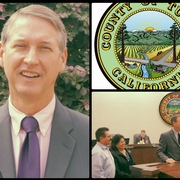
March 2014: Drought a "Disaster In the Making"
Editor's Note: Each month a member of the Board of Supervisors will be featured and deliver a personal note. This message is provided by District 4 Supervisor Steve Worthley.
In February, Tulare County received an abundance of rainfall when compared to previous months. Unfortunately, it was hardly enough to put a dent in a historic drought that has raised epic concern throughout the state and in the San Joaquin Valley.
In response to the crisis, State and Federal officials have passed or are considering drought relief packages that include short term solutions such as funding for storm water recapturing, expanded use of recycled water, better management of storage and stronger water conservation measures. In addition, food and housing assistance has been appropriated for people affected by the drought, such as farm workers who have lost or are going to lose employment because of the lack of water for agriculture.
From a local perspective, the County and the cities are doing their best to implement water conservation measures.
Water will not be used in the foreseeable future to irrigate landscapes at County facilities and parks. A drought task force is being formed to provide a platform in which various stakeholders can share concerns, ideas, and recommend short- and long-term solutions in response to the drought.
While as a community we are coming together to develop solutions, these efforts may not be enough to save our agriculture industry.
The United States Bureau of Reclamation announced last month that there will be no water allotment from Millerton Lake and the Friant-Kern Canal – a critical source of water for our residents and farmers in Tulare County.
As a result of not having this water, farmers will experience reduced crop production if not actual tree mortality. Reduced crop production will result in cuts to labor and reduced commerce with different agricultural support business. This is truly a disaster in the making.
Not only does the drought have an impact on farmers, it also has an impact to County government, which provides critical safety net services to all residents. County revenues will also be affected since most farmers are enrolled under the Williamson Act which taxes agricultural production as opposed to real property values. Dead trees will not produce income to farmers and will result in significant tax reductions to the county and other governmental agencies.
So as winter and spring comes to a pass and summer draws near, I would encourage residents to do their part in conserving water. Turn your sprinklers off. Don’t wash your car. Take shorter showers. Fix your leaky faucet. For more information on what you can do, please visit www.saveourh20.org.
